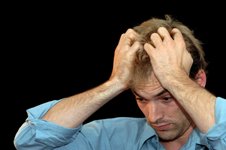THYROID - HAIR LOSS
You may have an undiagnosed problem with your thyroid - hair loss could be the first symptom you notice.
Perhaps, on your last trip to the hair dresser, she mentioned you seem to have less hair.
This is your clue that something is not right in your body.

Dysglycemia
According to Dr. Datis Kharrazian, author of "Why Do I Still Have Thyroid Symptoms when My Lab Tests are Normal?"
your body may have created a condition called dysglycemia.
Dysglycemia is when your body has lost the ability to stabilize your blood sugar.
The adrenals become exhausted and the digestive tract becomes weakened.
The stage is set for hormonal imbalances caused by a high carbohydrate diet. This leads to excess testosterone production.
Other conditions may arise from this hormonal imbalance including premenstrual syndrome, polycystic ovary syndrome, and difficult transition to menopause and thyroid hair loss.
Its possible you may even have functional thyroidism or Hashimotos disease.
Natural Alternative Treatment for Hair Loss
A natural alternative treatment for thyroid hair loss is the addition of essential fatty acids (EFAs) to your diet.
These can be found in fish oil, flaxseed oil, evening primrose oil, borage oil and black currant seed oil.
These supplements provide the necessary essential fatty acids, which are lacking in our modern diets. The hormones are nourished and stabilized.

Without the proper amount of essential fatty acids in your body, dihydrotestosterone or DHT binds to the receptors in your scalp follicles and shrinks them.
This makes it impossible for hair to survive and it dies.
Thyroid hair loss closely mimics male pattern baldness.
Conversion of testosterone to dihydrotestosterone at the hair follicle eventually leads to continued hair loss.
Low Iron May Cause Hair Loss
Janie A. Bowthorpe, M.Ed., author of Stop the Thyroid Madness: A Patient Revolution Against Decades of Inferior Treatment, addresses the issue of low ferritin.
Ferritin or iron storage protein go hand in hand with thyroidism. If you have lab work done and the result is low, it is a precursor to anemia.
With anemia, you may experience depression, fatigue and thyroid - hair loss.
A lab test should show a result in the range of 70 - 90. If you are below this level, you may take 150 - 200 mg. of elemental iron daily to resolve this problem. Make certain you read the label to determine how much elemental iron is in each tablet.
It may take months before you see the increase in the ferritin level.
Janie cautions that iron can bind thyroid hormones. Do not take iron at the same time you take thyroid hormones.
Iron may cause constipation. A magnesium supplement will soften the stool.
There are some conditions which should not be supplemented with
iron. I suggest you read her book for more valuable information.
Synthetic Thyroid Medication May Cause Hair Loss

If you are taking medication called levothyroxine or Synthroid for thyroid - hair loss is a side effect.
If you still have the insert from the box, it is listed as a side effect. Most physicians are not aware of this.
This prescription contains T4 (l-thyroxine, synthetic levothyroxine sodium.
Other brand names such as Levoxyl, Levothroid, Eltroxin, Oroxine, and Unithroid, along with Synthroid, all have one thing in common.
They only provide T4 medication. This is an incomplete formula for your thyroid.
Your body needs the complete compliment of T1, T2, T3 and T4 and calcitonin. This can be obtained from natural desiccated thyroid, such as
Armour.
Low Dosage of Thyroid Medication May Cause Hair Loss

If you are on thyroid medication, you may be under treated and your dosage may need to be increased.
Most ill informed physicians adhere to the TSH (Thyroid Stimulating Hormone) laboratory test. This appears to be the accepted standard for their diagnosis of your thyroid.
Unfortunately, this test ONLY measures the pituitary hormone, and is NOT an indicator of your thyroid's health.
The American Association of Clinical Endocrinologists (AACE)in the fall of 2002, re-evaluated the standard for TSH levels which were in the range of 0.5 to 5.0.
The new guidelines have narrowed the range from 0.3 t0 3.0, a much narrower range. AACE believes this new range will result in diagnosis of previously untreated patients.
This test stoll only reveals poor pituitary function.
In the face of new information, your physician may reconsider increasing your dosage.
If he won't comply with your request, find another doctor who is open to treating your symptoms, not the test results on a piece of paper.
FACTOID
As we age, the hair growth slows down to one-tenth of an inch per month.
You shed more hair in the fall and spring in response to the change of seasons and sunlight.
25% of your scalp hair can disappear before you will notice it.
Over $1.6 billion is spent in the US each year on treating hair loss.
Additional Disruptors for Hair Loss
There are additional factors you should consider.
Have you thought about the toxic levels of mercury in your body. You may need to do a mercury detox.
Are you aware of the halogens which are poisoning your body.
Are your adrenals exhausted? And, let's not forget about your raised cortisol levels which keep you in a state of complete exhaustion.
It's not simply a matter of hair loss.
You need to be aware of all the contributing factors that
cause your thyroid - hair loss. The hair loss is the visual result of
all these disruptors working in unison to destroy your health.
Leave Thyroid - Hair Loss and Return to Thyroid Disease Symptms
Leave Thyroid - Hair Loss and Return to Iodine Resource Home Page


